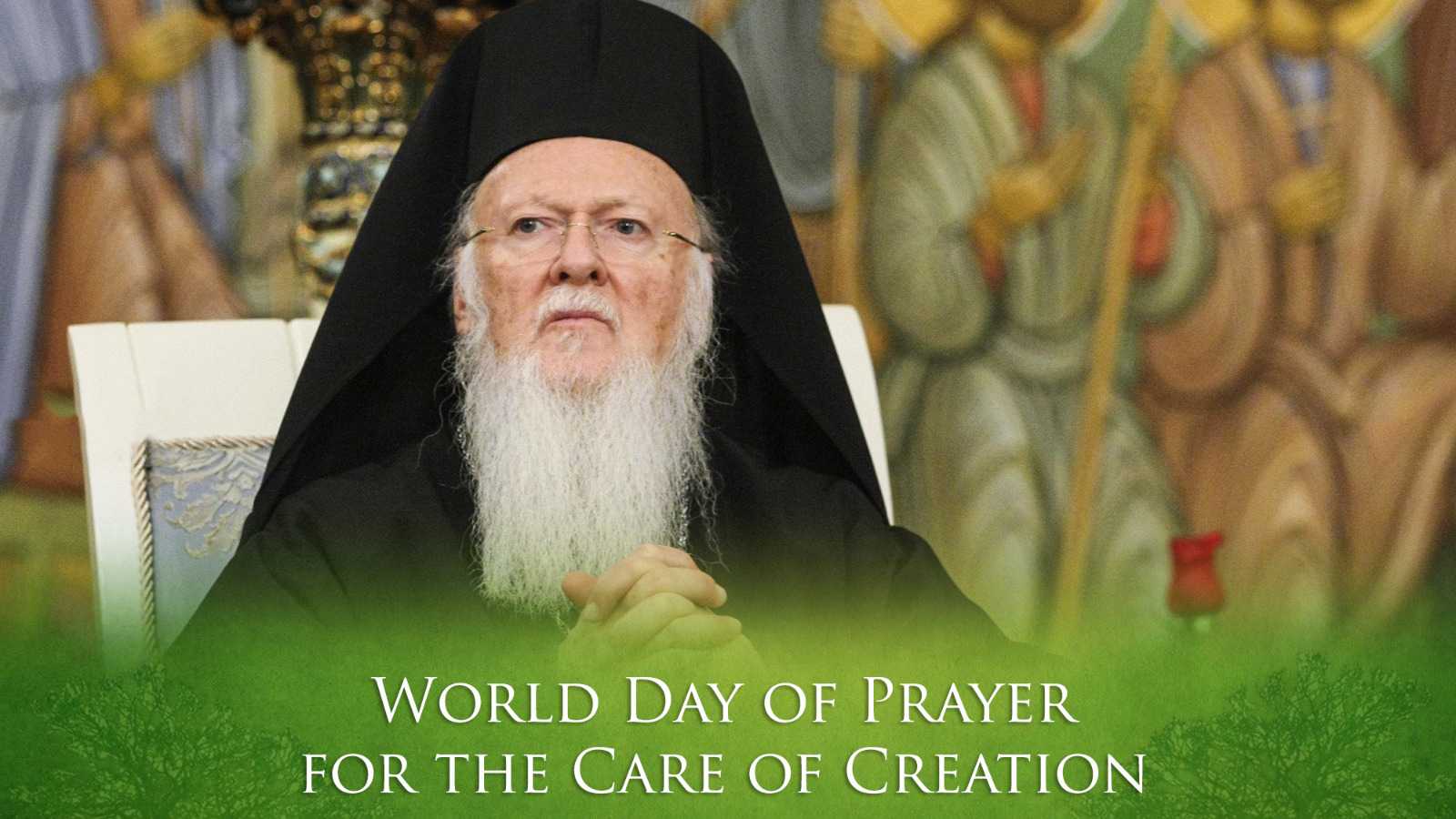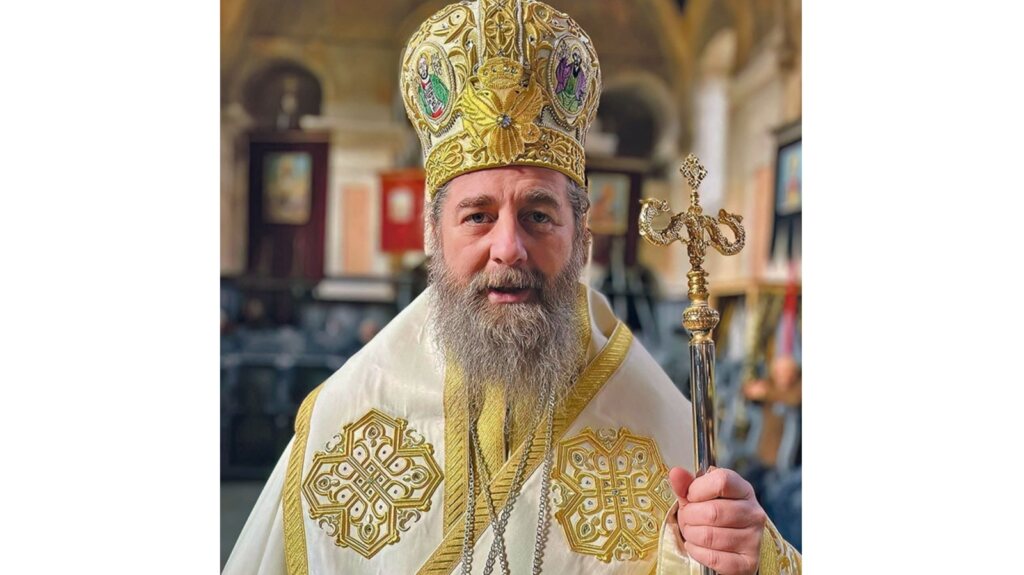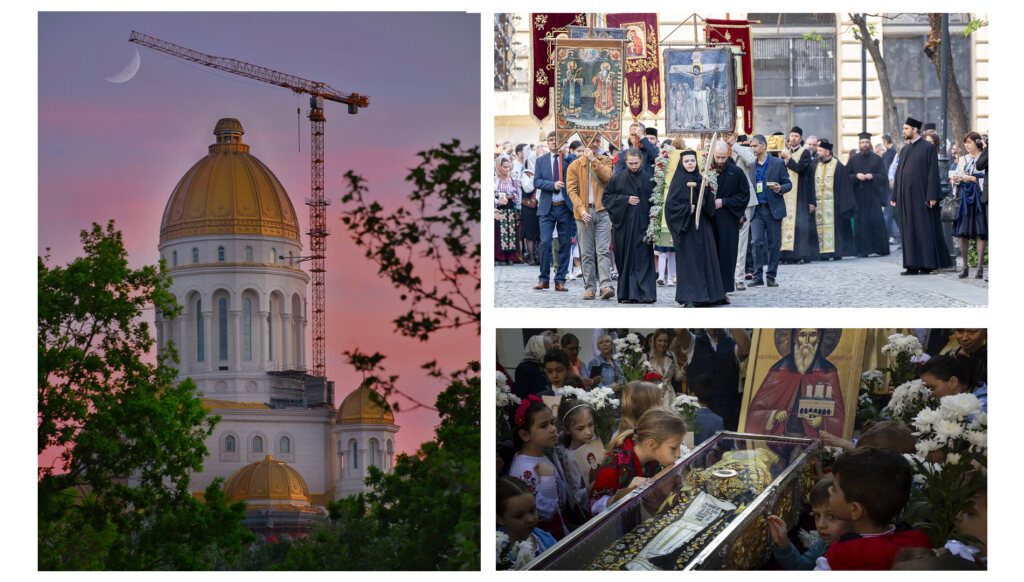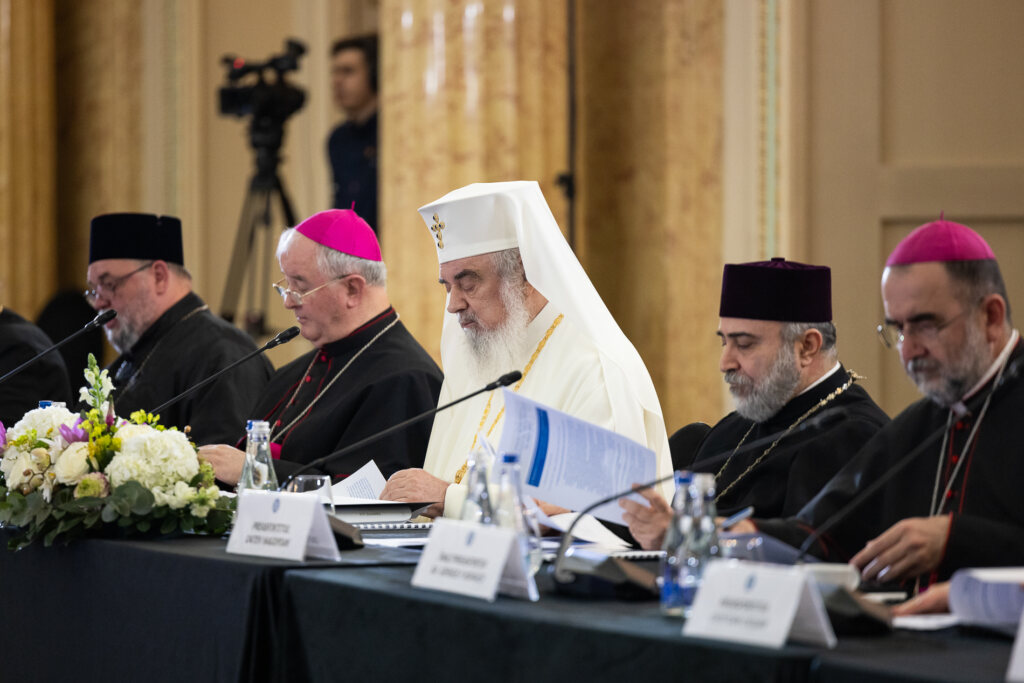† BARTHOLOMEW
By God’s Mercy Archbishop of Constantinople-New Rome and Ecumenical Patriarch
To the Plenitude of the Church: Grace, peace, and mercy
From the Creator of All, our Lord God and Savior Jesus Christ
(September 1, 2017)
Beloved brothers and sisters in the Lord,
With God’s grace, today we enter the new ecclesiastical year, even as we continue to provide witness “through him who loved us” (Romans 8.38) and “give an account for the hope that lies in us” (1 Peter 3.15), living in the Church, in Christ and according to Christ, who promised to be with us “all the days of our life, to the end of the age.” (Matthew 28.20)
Twenty-eight years have passed since the synodal decree of the Ecumenical Patriarchate to establish the Feast of the Indiction as the “Day of Protection for the Environment,” when we offer prayers and supplications at the sacred Center of Orthodoxy “for all creation.” The relevant patriarchal encyclical (September 1, 1989) invited all Orthodox and other Christian faithful on this day to lift up prayers of thanksgiving to the Creator of all for “the great gift of Creation” along with petitions for its preservation.
We express our joy and satisfaction for the broad reception and fruitful influence of this initiative by the Church of Constantinople. We demonstrated the spiritual roots of the ecological crisis as well as the need to repent and prioritize the values of contemporary humankind. We affirmed that the exploitation and destruction of creation constitute a perversion and distortion of the Christian ethos, rather than the inevitable consequence of the biblical command to “increase and multiply” (Genesis 1.22), but also that our anti-ecological conduct is an offense to the Creator and a transgression of his commandments, ultimately working against the authentic destiny of the human person. There cannot be any sustainable development at the expense of spiritual values and the natural environment.
The Holy and Great Church of Christ has championed and continues to champion the eco-friendly dynamic of our Orthodox faith, emphasizing the Eucharistic purpose of creation, the response of the faithful as “priest” of creation in an effort to offer it unceasingly to the Creator of all, as well as the principle of asceticism as the response to the modern sense of gratification. Indeed, respect for creation belongs to the very core of our orthodox tradition.
We are especially disturbed by the fact that, while it is clear that the ecological crisis is constantly escalating, in the name of financial growth and technological development, humanity has become oblivious to the global appeals for radical change in our attitude toward creation. It is obvious that the resulting deformation and devastation of the natural environment is a direct consequence of a specific model of economic progress, which is nevertheless indifferent to its ecological repercussions. The short-term benefits dictated by the rise of living standards in some parts of the world simply camouflage the irrationality of abuse and conquest of creation. Corporate business that does not respect the planet as our common home cannot be sanctioned as business at all. The contemporary unrestrained commerce of globalization goes hand-in-hand with the spectacular development of science and technology, which despite manifold advantages is also accompanied by an arrogance over and abuse of nature. Modern man knows this very well but acts as if he is entirely unaware. We know that nature is not restored and renewed endlessly, yet we ignore the negative implications of “trading” in the environment. This explosive combination of unrestrained commerce and science – that is to say, the limitless confidence in the power of science and technology – merely increases the risks threatening the integrity of creation and humankind.
The Holy and Great Council of the Orthodox Church spelled out with wisdom and clarity the dangers of “autonomizing economy” or separating economy from the vital needs of humanity that are only served within a sustainable environment. Instead, it proposed an economy “founded on the principles of the Gospel”[1] in order to address the modern ecological challenge “on the basis of the principles of the Christian tradition.”[2] In response to the threats of our age, the tradition of the Church demands “a radical change of attitude and conduct”; in response to the ecological crisis, it proposes a spirit of asceticism, “frugality and abstinence”[3]; in response to our “greed,”[4] it calls for “the deification of our needs and attitude of acquisition.”[5] The Holy and Great Council also emphatically referred to the “social dimensions and tragic consequences of destroying the natural environment.”[6]
Therefore, echoing the decisions of this Council, we too underline through this encyclical the close connection between ecological and social issues, as well as their common roots that lie in the “imprudent heart” that is fallen and sinful as well as in the inappropriate use of our God-given freedom. The destruction of nature and society is always preceded by an internal “reversal of values,” by spiritual and ethical damage. When material possessions dominate our heart and mind, then our attitude toward our fellow human beings and toward creation inevitably becomes possessive and abusive. In biblical terms, the “bad tree” always “produces evil fruit.” (Matthew 7.17) Furthermore, by extension, we would underline that respecting creation and other people share the same spiritual source and origin, namely our renewal in Christ and spiritual freedom. Just as environmental destruction is related to social injustice, so too an eco-friendly attitude is inseparable from social solidarity.
What also becomes apparent is that the solution to the multi-faceted contemporary human crisis – namely, the crisis facing human culture and the natural environment – demands a multi-dimensional mobilization and joint effort. Much as every other vital problem, the underlying and interconnected ecological and social crisis cannot possibly be addressed without inter-Christian and inter-religious collaboration. Therefore, dialogue becomes the fertile ground for promoting existing eco-friendly and social traditions in order to stimulate environmental and communal discussion, while at the same time initiating a constructive criticism of progress understood exclusively in technological and economic terms at the expense of creation and civilization.
In closing, we once again reiterate the inseparable nature of respecting creation and humanity, and we call upon all people of good will to undertake the good struggle for the protection of the natural environment and the establishment of solidarity. May the Lord and giver of all good things, through the intercessions of the all-blessed Mother of God, grant all of you “a burning within your hearts for all creation”[7] and “a stirring of love and good works.” (Hebrews 10.24)
† Bartholomew of Constantinople
Your fervent supplicant before God
[1] Encyclical of the Holy and Great Council, paragraph 15.
[2] Encyclical, paragraph 10.
[3] “The Mission of the Orthodox Church in the Contemporary World,” paragraph 10.
[4] “The Mission,” paragraph 10.
[5] Encyclical, paragraph 14.
[6] Encyclical, paragraph 14.
[7] Isaac the Syrian, Ascetical Treatises, Homily 81.
† Bartholomée par la grâce de dieu archevêque de Constantinople, Nouvelle Rome, et patriarche œcuménique que la grâce, la paix et la miséricorde de notre Seigneur, Dieu et Sauveur Jésus Christ, auteur de toute la création, soient avec tout le plérôme de l’Église
Frères et enfants bien-aimés dans le Seigneur,
Par la grâce de Dieu, nous entamons aujourd’hui la nouvelle année ecclésiastique, continuant « par l’amour de Dieu manifesté en Jésus Christ » de témoigner et justifier « notre espérance » , vivant dans l’Église, vivant en Christ Qui a promis d’être avec nous « tous les jours jusqu’à la fin des temps » .
Il y a vingt-huit ans, par décision synodale, le Patriarcat Œcuménique a fixé le fête de l’Indiction comme « Journée de protection de l’environnement » au cours de laquelle, des prières et des suppliques « pour la création tout entière » sont adressées depuis le Centre sacré de l’Orthodoxie. L’encyclique patriarcale diffusée à cette occasion a invité le monde orthodoxe et l’ensemble du monde chrétien à adresser, en ce jour, des prières pour remercier le Créateur de toutes choses du « grand don de la Création » et Le supplier de protéger celle-ci.
Nous exprimons humblement notre joie et satisfaction pour l’écho et la fructification de cette initiative de l’Église constantinopolitaine. Nous avons montré les racines spirituelles de la crise écologique, la nécessité aussi de faire pénitence et de procéder à une nouvelle hiérarchisation des valeurs de l’homme moderne. Il s’est avéré que l’exploitation et la destruction de la création est une perversion et altération de l’ethos chrétien ; que ce n’est pas une conséquence inéluctable du commandement biblique « soyez féconds et prolifiques » ; que le comportement anti-écologique est une insulte au Créateur et une transgression à Ses commandements, et que ce comportement va à l’encontre de la vraie destination de l’être humain. Il ne saurait y avoir de développement viable aux dépens des valeurs spirituelles et de l’environnement naturel.
La sainte Grande Église du Christ ne cesse de mettre en relief le potentiel écophile de notre foi orthodoxe, montrant l’usage eucharistique de la création, la fonction du croyant en tant qu’« officiant » de la Création qui sans repos ni trêve réfère celle-ci au Créateur de tout et la valeur incomparable de l’esprit ascétique comme antidote à l’eudémonisme contemporain. Effectivement, le respect de la création appartient au noyau de la tradition orthodoxe.
Nous sommes très préoccupés du fait qu’alors que la crise écologique va indubitablement en s’aggravant, l’humanité fasse semblant, au nom du développement économique et des applications technologiques, de ne pas entendre les appels pour changer radicalement de comportement envers la création. Manifestement, la dégradation déjà subie par l’environnement naturel est une conséquence d’un modèle concret de développement économique qui se désintéresse de ses retombées anti-écologiques. Les bénéfices à court terme, associés à l’amélioration du niveau de vie dans certaines régions de la terre, ne font que dissimuler la déraison que constituent l’exploitation et le pillage de la création. L’activité économique qui ne respecte pas la maison de la vie, c’est de l’anti-économie et non pas de l’éco-nomie. L’économisme effréné pratiqué par la globalisation va aujourd’hui de pair avec le développement fulgurant de la science et de la technologie qui, malgré ses bénéfices, est assorti d’une attitude orgueilleuse à l’égard de la création et de l’exploitation diverse de celle-ci. Notre contemporain sait, mais il agit comme s’il ne savait pas. Il sait que la nature ne se renouvelle pas indéfiniment, mais il se désintéresse des conséquences négatives sur l’environnement du « marché technologique ». Ce mélange vraiment explosif de l’économisme débridé et du scientifisme, c’est-à-dire de la confiance illimitée placée dans le pouvoir de la science et de l’économie, accroît les risques pesant sur l’intégrité de la création et sur l’être humain.
Le saint et grand Concile de l’Église orthodoxe a sagement et clairement nommé les risques de la « loi de l’économie », c’est-à-dire l’économie émancipée par rapport aux besoins vitaux de l’être humain qui ne peuvent être valablement servis que dans un environnement naturel viable ; il a proposé une économie durable « fondée sur les principes de l’Évangile » et la solution au problème écologique contemporain « sur la base des principes de la tradition chrétienne » . Face aux menaces contemporaines, la tradition de l’Église exige de changer radicalement « de mentalité et de comportement » à l’égard de la création, d’adopter l’esprit ascétique « de frugalité et de modération » , pour affronter « l’avidité » , « le culte des besoins et le sentiment de possession » . Le saint et grand Concile a aussi mis l’accent sur « les aspects sociaux et les retombées tragiques que représente la destruction de l’environnement naturel » .
Nous conformant aux décisions de ce Concile, dans notre présente encyclique, nous soulignons le rapport étroit liant les problèmes environnementaux et sociaux ; le fait qu’ils puisent leur racine dans le « cœur insensé » sans Dieu, dans la chute et le péché, dans l’abus de la liberté humaine accordée par Dieu. La destruction de l’environnement et de la société est toujours précédée d’un « bouleversement des valeurs » venant de l’intérieur, d’une déchéance spirituelle et morale. Lorsque l’avoir domine notre intelligence et notre cœur, notre attitude tant envers notre prochain qu’à l’égard de la création est inévitablement possessive et impropre. Selon l’Évangile, « L’arbre malade » produit toujours « de mauvais fruits » .
Nous soulignons respectivement que la considération vouée à la création et à l’être humain ont la même source et point de départ, c’est-à-dire le renouveau en Christ de l’homme et sa liberté bénie. De même la destruction de l’environnement et l’injustice sociale vont de pair, de même le comportement écophile et la solidarité sociale sont indissociables.
Il va de soi que pour faire face à la crise plurivalente à laquelle l’humanité, sa civilisation et sa maison sont confrontées de nos jours, une mobilisation de toutes parts et un effort commun s’imposent. De même s’agissant des problèmes majeurs, de même des crises qui sévissent et s’interpénètrent de l’environnement naturel et de la société, il est impossible d’en venir à bout sans une coopération interchrétienne et interreligieuse. Le dialogue est en l’occurrence le terrain propice pour mettre en relief les traditions écophiles et sociales, la sensibilisation écologique et sociale ; pour faire aussi une critique constructive du progrès exclusivement technologique et économique, et des modèles individualistes et sociocentriques, opérant au détriment de la création et de la civilisation de la personne humaine.
En concluant, nous soulignons encore une fois le respect irréductible envers la création et la personne humaine, nous appelons tous les êtres humains de bonne volonté à s’engager dans le bon combat pour protéger l’environnement naturel et pour consolider la solidarité, et nous prions le Seigneur dispensateur de tout bien, par l’intercession de la toute-Sainte Mère de Dieu Pammakaristos, de gratifier ses enfants d’« un cœur se consumant pour toute la création » et « excité à la charité et aux œuvres bonnes » . 1er septembre 2017
† Bartholomée de Constantinople votre fervent intercesseur devant Dieu
† Β Α Ρ Θ Ο Λ Ο Μ Α Ι Ο Σ
ΕΛΕΩι ΘΕΟΥ ΑΡΧΙΕΠΙΣΚΟΠΟΣ ΚΩΝΣΤΑΝΤΙΝΟΥΠΟΛΕΩΣ
ΝΕΑΣ ΡΩΜΗΣ ΚΑΙ ΟΙΚΟΥΜΕΝΙΚΟΣ ΠΑΤΡΙΑΡΧΗΣ
ΠΑΝΤΙ Τῼ ΠΛΗΡΩΜΑΤΙ ΤΗΣ ΕΚΚΛΗΣΙΑΣ ΧΑΡΙΝ, ΕΙΡΗΝΗΝ ΚΑΙ ΕΛΕΟΣ
ΠΑΡΑ ΤΟΥ ΔΗΜΙΟΥΡΓΟΥ ΠΑΣΗΣ ΤΗΣ ΚΤΙΣΕΩΣ ΚΥΡΙΟΥ
ΚΑΙ ΘΕΟΥ ΚΑΙ ΣΩΤΗΡΟΣ ΗΜΩΝ ΙΗΣΟΥ ΧΡΙΣΤΟΥ
Ἀδελφοὶ καὶ τέκνα ἐν Κυρίῳ,
Χάριτι Θεοῦ εἰσερχόμεθα σήμερον εἰς τὸ νέον ἐκκλησιαστικὸν ἔτος, συνεχίζοντες «διὰ τοῦ ἀγαπήσαντος ἡμᾶς»[1] συμμαρτυρεῖν καὶ λόγον διδόναι «περὶ τῆς ἐν ἡμῖν ἐλπίδος»[2], ζῶντες ἐν Ἐκκλησίᾳ, ἐν Χριστῷ καὶ κατὰ Χριστόν, ὁ Ὁποῖος ἐπηγγείλατο νὰ εἶναι μαζί μας «πάσας τὰς ἡμέρας ἕως τῆς συντελείας τοῦ αἰῶνος»[3].
Παρῆλθον εἰκοσιοκτὼ ἔτη ἀπὸ τήν, συνοδικῇ ἀποφάσει, καθιέρωσιν ὑπὸ τοῦ Οἰκουμενικοῦ Πατριαρχείου, τῆς ἑορτῆς τῆς Ἰνδίκτου ὡς «Ἡμέρας προστασίας τοῦ περιβάλλοντος», κατὰ τὴν ὁποίαν ἐν τῷ Ἱερῷ Κέντρῳ τῆς Ὀρθοδοξίας ἀναπέμπονται εὐχαὶ καὶ ἱκεσίαι «ὑπὲρ τῆς ὅλης δημιουργίας». Ἡ σχετικὴ πατριαρχικὴ ἐγκύκλιος ἐκάλεσε σύμπαντα τὸν ὀρθόδοξον καὶ τὸν λοιπὸν χριστιανικὸν κόσμον, ὅπως ἀναπέμπῃ κατὰ τὴν ἡμέραν αὐτὴν εὐχαριστηρίους δεήσεις πρὸς τὸν Κτίστην τῶν ὅλων διὰ τὸ «μέγα δῶρον τῆς Δημιουργίας»[4] καὶ ἱκεσίας διὰ τὴν προστασίαν αὐτῆς.
Ἐκφράζομεν τὴν χαρὰν καὶ τὴν ἱκανοποίησιν τῆς ἡμετέρας Μετριότητος διὰ τὴν ἀπήχησιν καὶ τὴν πλουσίαν καρποφορίαν τῆς ἐν λόγῳ πρωτοβουλίας τῆς Κωνσταντινουπολίτιδος Ἐκκλησίας. Ἀνεδείξαμεν τὰς πνευματικὰς ρίζας τῆς οἰκολογικῆς κρίσεως καὶ τὴν ἀνάγκην μετα-νοίας καὶ ἐπανιεραρχήσεως τῶν ἀξιῶν τοῦ συγχρόνου ἀνθρώπου. Ἐβεβαιώθη, ὅτι ἡ ἐκμετάλλευσις καὶ ἡ καταστροφὴ τῆς κτίσεως ἀποτελοῦν διαστρέβλωσιν καὶ κακὴν ἀλλοίωσιν τοῦ χριστιανικοῦ ἤθους καὶ ὄχι ἀναγκαίαν συνέπειαν τῆς βιβλικῆς ἐντολῆς «αὐξάνεσθε καὶ πληθύνεσθε…»[5], ὅτι ἡ ἀντιοικολογικὴ συμπεριφορὰ εἶναι προσβολὴ τοῦ Δημιουργοῦ καὶ ἀθέτησις τῶν ἐντολῶν Του, καὶ ὅτι λειτουργεῖ κατὰ τοῦ ἀληθοῦς προορισμοῦ τοῦ ἀνθρώπου. Δὲν εἶναι δυνατὸν νὰ ὑπάρξῃ βιώσιμος ἀνάπτυξις εἰς βάρος τῶν πνευματικῶν ἀξιῶν καὶ τοῦ φυσικοῦ περιβάλλοντος.
Ἡ Ἁγία τοῦ Χριστοῦ Μεγάλη Ἐκκλησία προέβαλε καὶ προβάλλει τὸ οἰκοφιλικὸν δυναμικὸν τῆς Ὀρθοδόξου ἡμῶν πίστεως, ἀναδεικνύουσα τὴν εὐχαριστιακὴν χρῆσιν τῆς κτίσεως, τὴν λειτουργίαν τοῦ πιστοῦ ὡς «ἱερέως» τῆς Δημιουργίας, ὁ ὁποῖος ἀδιαλείπτως ἀναφέρει αὐτὴν εἰς τὸν Κτίστην τῶν ἁπάντων, καὶ τὴν ἀνυπέρβλητον ἀξίαν τοῦ ἀσκητικοῦ πνεύματος, ὡς ἀντιδότου κατὰ τοῦ συγχρόνου εὐδαιμονισμοῦ. Ὄντως, ὁ σεβασμὸς τῆς δημιουργίας ἀνήκει εἰς τὸν πυρῆνα τῆς ὀρθοδόξου παραδόσεως.
Προκαλεῖ ἰδιαιτέραν ἀνησυχίαν τὸ γεγονὸς ὅτι, ἐνῶ εἶναι βέβαιον ὅτι ἡ οἰκολογικὴ κρίσις συνεχῶς ἐπιτείνεται, ἡ ἀνθρωπότης, ἐν ὀνόματι τῆς οἰκονομικῆς ἀναπτύξεως καὶ τῶν τεχνολογικῶν ἐφαρμογῶν, κωφεύει εἰς τὰς πανταχόθεν ἐκκλήσεις πρὸς ριζικὴν ἀλλαγὴν συμπεριφορᾶς ἀπέναντι εἰς τὴν κτίσιν. Εἶναι προφανὲς ὅτι ἡ προϊοῦσα ἀλλοίωσις τοῦ φυσικοῦ περιβάλλοντος ἀποτελεῖ συνέπειαν ἑνὸς συγκεκριμένου προτύπου οἰκονομικῆς ἀναπτύξεως, τὸ ὁποῖον ἀδιαφορεῖ διὰ τὰς ἀντιοικολογικὰς ἐπιπτώσεις του. Τὰ βραχυπρόθεσμα ὀφέλη ἀπὸ τὴν ἄνοδον τοῦ βιοτικοῦ ἐπιπέδου εἰς ὡρισμένας περιοχὰς τῆς ὑφηλίου, ἁπλῶς ἐπικαλύπτουν τὴν ἀλογίαν τῆς ἐκμεταλλεύσεως καὶ συλήσεως τῆς δημιουργίας. Ἡ οἰκονομικὴ δραστηριότης, ἡ ὁποία δὲν σέβεται τὸν οἶκον τῆς ζωῆς, εἶναι οἰκο-ανομία καὶ ὄχι οἰκο-νομία. Ὁ ἄκρατος οἰκονομισμὸς τῆς παγκοσμιοποιήσεως συμπορεύεται σήμερον μὲ τὴν ἁλματώδη ἀνάπτυξιν τῆς ἐπιστήμης καὶ τῆς τεχνολογίας, ἡ ὁποία, παρὰ τὰ πολλὰ εὐεργετήματά της, συνοδεύεται ἀπὸ ἔπαρσιν ἔναντι τῆς φύσεως καὶ ὁδηγεῖ εἰς ποικιλομόρφους ἐκμεταλλεύσεις αὐτῆς. Ὁ σύγχρονος ἄνθρωπος γνωρίζει, ἀλλὰ δρᾷ ὡς νὰ μὴ ἐγνώριζε. Γνωρίζει ὅτι ἡ φύσις δὲν αὐτοανακαινίζεται εἰς τὸ διηνεκές, ἀδιαφορεῖ ὅμως διὰ τὰς ἀρνητικὰς συνεπείας τοῦ «τεχνοπωλίου» διὰ τὸ περιβάλλον. Αὐτὸ τὸ ὄντως ἐκρηκτικὸν μῖγμα τοῦ ἀκράτου οἰκονομισμοῦ καὶ τοῦ ἐπιστημονισμοῦ, ἤτοι τῆς ἀπεριορίστου ἐμπιστοσύνης εἰς τὴν δύναμιν τῆς ἐπιστήμης καὶ τῆς τεχνολογίας, ἐπιτείνει τοὺς κινδύνους διὰ τὴν ἀκεραιότητα τῆς δημιουργίας καὶ διὰ τὸν ἄνθρωπον.
Ἡ Ἁγία καὶ Μεγάλη Σύνοδος τῆς Ὀρθοδόξου Ἐκκλησίας, σοφῶς καὶ σαφῶς κατωνόμασε τοὺς κινδύνους τῆς «ἰδιονομίας τῆς οἰκονομίας», τῆς αὐτονομήσεως αὐτῆς ἀπὸ τὰς ζωτικὰς ἀνάγκας τοῦ ἀνθρώπου, αἱ ὁποῖαι ὑπηρετοῦνται μόνον ἐντὸς βιωσίμου φυσικοῦ περιβάλλοντος, καὶ προέτεινε μίαν οἰκονομίαν «τεθεμελιωμένην εἰς τὰς ἀρχὰς τοῦ Εὐαγγελίου»[6] καὶ τὴν ἀντιμετώπισιν τοῦ συγχρόνου οἰκολογικοῦ προβλήματος «ἐπὶ τῇ βάσει τῶν ἀρχῶν τῆς χριστιανικῆς παραδόσεως»[7]. Ἡ παράδοσις τῆς Ἐκκλησίας ἀπαιτεῖ, ἐνώπιον τῶν συγχρόνων ἀπειλῶν, «ριζικὴν ἀλλαγὴν νοοτροπίας καὶ συμπεριφορᾶς» ἀπέναντι εἰς τὴν κτίσιν, πνεῦμα ἀσκητισμοῦ, «ὀλιγαρκείας καὶ ἐγκρατείας»[8], ἔναντι τῆς «ἀπληστίας»[9], τῆς «θεοποιήσεως τῶν ἀναγκῶν καὶ τῆς κτητικῆς στάσεως»[10]. Ἡ Ἁγία καὶ Μεγάλη Σύνοδος ἀνεφέρθη μετ᾿ ἐμφάσεως καὶ εἰς τὰς «κοινωνικὰς διαστάσεις καὶ τὰς τραγικὰς ἐπιπτώσεις τῆς καταστροφῆς τοῦ φυσικοῦ περιβάλλοντος»[11].
Ἀκολουθοῦντες τὰς ἀποφάσεις τῆς Συνόδου ταύτης, ὑπογραμμίζομεν, εἰς τὴν παροῦσαν ἐγκύκλιόν μας, τὴν στενὴν συνάφειαν τῶν περιβαλλοντικῶν καὶ τῶν κοινωνικῶν προβλημάτων καὶ τὴν κοινὴν ρίζαν αὐτῶν ἐν τῇ χωρὶς Θεὸν «ἄφρονι καρδίᾳ», ἐν τῇ πτώσει καὶ ἁμαρτίᾳ, ἐν τῇ κακῇ χρήσει τῆς θεοσδότου ἐλευθερίας τοῦ ἀνθρώπου. Τῆς καταστροφῆς τῆς φύσεως καὶ τῆς κοινωνίας προηγεῖται πάντοτε μία ἐσωτερικὴ «ἀνατροπὴ τῶν ἀξιῶν», μία πνευματικὴ καὶ ἠθικὴ καταστροφή. Ὅταν τὸ ἔχειν κυριεύσῃ τὸν νοῦν καὶ τὴν καρδίαν μας, τότε ἡ στάσις μας τόσον ἔναντι τοῦ συνανθρώπου, ὅσον καὶ πρὸς τὴν κτίσιν, εἶναι ἀναποφεύκτως κτητικὴ καὶ ἀνοίκειος. Τὸ «σαπρὸν δένδρον» ποιεῖ, κατὰ τὸ Βιβλικόν, πάντοτε «καρποὺς πονηρούς»[12].
Τονίζομεν, ἀντιστοίχως, ὅτι καὶ ὁ σεβασμὸς πρὸς τὴν κτίσιν καὶ πρὸς τὸν ἄνθρωπον ἔχουν τὴν αὐτὴν πνευματικὴν πηγὴν καὶ ἀφετηρίαν, τὴν ἐν Χριστῷ δηλαδὴ ἀνακαίνισιν τοῦ ἀνθρώπου καὶ τὴν κεχαριτωμένην ἐλευθερίαν του. Ὡς ἡ καταστροφὴ τοῦ περιβάλλοντος καὶ ἡ κοινωνικὴ ἀδικία συμπορεύονται, ἔτσι καὶ ἡ οἰκοφιλικὴ συμπεριφορὰ καὶ ἡ κοινωνικὴ ἀλληλεγγύη εἶναι ἀδιαίρετοι.
Εἶναι αὐτονόητον, ὅτι διὰ τὴν ἀντιμετώπισιν τῆς συγχρόνου πολυδιαστάτου κρίσεως τοῦ ἀνθρώπου, τοῦ πολιτισμού του καὶ τοῦ οἴκου του, ἀπαιτεῖται πολύπλευρος κινητοποίησις καὶ κοινὴ προσπάθεια. Ὅπως ὅλα τὰ μεγάλα προβλήματα, οὕτω καὶ αἱ σοβοῦσαι ἀλληλοπεριχωρούμεναι κρίσεις τοῦ φυσικοῦ περιβάλλοντος καὶ τῆς κοινωνίας, εἶναι ἀδύνατον νὰ ἀντιμετωπισθοῦν χωρὶς τὴν διαχριστιανικὴν καὶ διαθρησκειακὴν συνεργασίαν. Ὁ διάλογος εἶναι ἐδῶ πρόσφορος χῶρος διὰ νὰ ἀναδειχθοῦν αἱ ὑπάρχουσαι οἰκοφιλικαὶ καὶ κοινωνικαὶ παραδόσεις, διὰ οἰκολογικὴν καὶ κοινωνικὴν εὐαισθητοποίησιν, καθὼς καὶ διὰ ἐποικοδομητικὴν κριτικὴν τῆς ἀποκλειστικῶς τεχνολογικῆς καὶ οἰκονομικῆς προόδου καὶ τῶν ἀτομοκεντρικῶν καὶ κοινωνιοκρατικῶν προτύπων, εἰς βάρος τῆς κτίσεως καὶ τοῦ πολιτισμοῦ τοῦ προσώπου.
Κατακλείοντες, ὑπογραμμίζομεν καὶ πάλιν τὸ ἀδιαίρετον τοῦ σεβασμοῦ πρὸς τὴν δημιουργίαν καὶ πρὸς τὸ ἀνθρώπινον πρόσωπον, καλοῦμεν πάντας τοὺς ἀνθρώπους καλῆς θελήσεως εἰς τὸν καλὸν ἀγῶνα διὰ τὴν προστασίαν τοῦ φυσικοῦ περιβάλλοντος καὶ τὴν ἑδραίωσιν τῆς ἀλληλεγγύης, καὶ δεόμεθα πρὸς τὸν ἀγαθοδότην Κύριον, πρεσβείαις τῆς Παναγίας τῆς Παμμακαρίστου, νὰ χαρίζῃ εἰς τὰ τέκνα αὐτοῦ «καῦσιν καρδίας ὑπὲρ πάσης τῆς κτίσεως»[13] καὶ «παροξυσμὸν ἀγάπης καὶ καλῶν ἔργων»[14]. ,
βιζ’ Σεπτεμβρίου α’
Ὁ Κωνσταντινουπόλεως
διάπυρος πρὸς Θεὸν εὐχέτης πάντων ὑμῶν
_____________________________
[1] Ρωμ. η΄, 38
[2] πρβλ. Α΄ Πέτρ. γ΄, 15
[3] Ματθ. κη΄, 20
[4] Ἐγκύκλιος ἐπὶ τῇ ἑορτῇ τῆς Ἰνδίκτου, 1/9/1989
[5] Γεν. α΄, 22
[6] Ἐγκύκλιος, §15
[7] ὅ. π., §15
[8] Ἡ Ἀποστολὴ τῆς Ὀρθοδόξου Ἐκκλησίας εἰς τὸν σύγχρονον κόσμον, §10
[9] ὅ. π., §10
[10] Ἐγκύκλιος, §14
[11] ὅ. π.
[12] Ματθ. ζ’, 17
[13] Ἰσαὰκ ὁ Σῦρος, Τὰ εὑρεθέντα ἀσκητικά, Λόγος, πα΄
[14] Ἑβρ. ι’, 24






